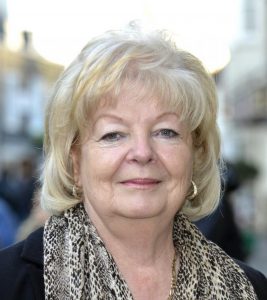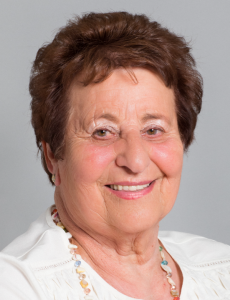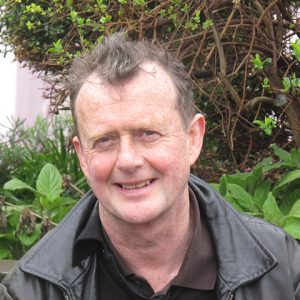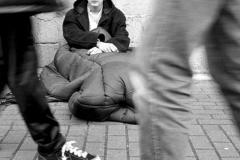More than half of the rough sleepers and homeless people housed under the covid-19 “Everyone In” policy have moved into long-term accommodation but people are still begging on the streets.
Brighton and Hove City Council received £3.4 million from the government to rehouse those who were rough sleepers or living in dormitory-style accommodation.
They were given their own rooms last spring as part of the effort to try to contain the coronavirus.
However, during a meeting of the council’s Housing Committee yesterday (Wednesday 20 January), Conservative councillors raised concerns about aggressive begging on the city streets.
They virtual meeting was told that many people housed during the pandemic were still feeding addictions.
Conservative councillor Mary Mears said that the council needed to address the “elephant in the room” – quoting Brighton Housing Trust (BHT) chief executive Andy Winter – and deal with begging.
She said: “Until we do something about this, we are not going to change people’s lives.
“We are spending government money moving people on but we are not dealing with addiction in the long term and making no difference to lives.”
Another Conservative councillor Dawn Barnett said that she has spoken with people begging in her ward of Hangleton and Knoll, to understand their situation.
Councillor Barnett said: “Several told me they live in accommodation provided by the council, receive food and benefit, but continue to beg on the streets due to their addictions. They feel nothing will be done to stop them.
“Some of these beggars have told me they are getting more than £1,000 a month in benefits as well as getting their accommodation paid for.
“But they still beg because it’s not sufficient to sustain what they need. I feel rehab should be compulsory for these people.”
She asked how many people were begging on the streets, what was being done to end begging and she called for a cashless donation scheme.

Green councillor David Gibson, who chaired the Housing Committee meeting, agreed that many beggars were not rough sleepers but were people who had been housed by the council.
He said: “Addiction is a health issue. Certainly, during the pandemic, a lot of people have said to people who have got quite desperate, and maybe aggressive, when they say, ‘Can I have some money for a hostel?’ – well, the council is housing everyone, so they haven’t been given the money they were given in the past.
“There are fewer people on the streets and that’s made people more desperate. That is one aspect of the issue.
“There is the Make Change Council fundraising scheme to support BHT and other organisations, who are working to support homeless people and those with addictions.”

The council had helped 369 people under the Everyone In scheme by the end of September, the meeting was told, and 186 were moved into long-term housing by the end of the year.
Housing officer Sylvia Peckham said that this exceeded the requirement to find homes for at least 40 per cent to qualify for all the money on offer from the government.
However, a further 23 rough sleepers were now under the council’s care, the meeting was told, and 225 people remained in need of long-term housing.
There were currently an estimated 30 people still sleeping on the streets.
Ms Peckham said that 10 new people were found on the streets last week, with two declining to engage with the council.

Councillors and members of the public also asked about the Severe Weather Emergency Protocol (SWEP) winter night shelter.
They were told that, during the coronavirus pandemic, the shelter was operating on nights when there were amber alert weather warnings or the temperature was freezing or felt like freezing.
Labour councillor Gill Williams asked why it was a “secret SWEP”, with housing campaigners and volunteers, rough sleepers and most councillors unaware of where rough sleepers should go in bad weather.
Councillor Williams said: “We need to explain the rationale to the way SWEP is operating this winter. I know a lot of this is because we cannot have congregate accommodation.
“Can we change it? Because I do understand the concerns the public feel.

“I know the response is phenomenal. Once I got on the phone and within 40 minutes a person was housed. I know a lot of work is going on.
“We need to address the idea of secret SWEP. If people have some signposting, they may feel reassured.”
Councillor Williams was told that the council offered somewhere to all homeless people and put people up during poor weather and could even support people with pet dogs – previously something of a problem.
Anyone who has concerns about someone sleeping rough can call the council’s Streetlink team on 0300 500 0914.









The biggest trouble with this council is there is way too much money wasted ‘talking’ about things and non-conclusive ‘research’ into the issues when a single rail fare home to their town/city of origin would save SO much TAXPAYER’S money.
Begging is illegal. The police should arrest and detain anyone begging aggressively. At the same time (and missing from the discussion above) is the use of beggars by organised crime. Begging gangs were reported on in the Argus in Aug 2019 following people reporting seeing beggars being dropped off by vans.
Perhaps it is time to make giving money to beggars illegal ?
They seem to have settled very nicely outside supermarkets, especially those with a cash machine outside.
Sainsburys in the centre of Western Road now has a new resident to welcome shoppers, a young woman who is happy to sit there, chatting on her mobile.One can only guess what the calls are about. And having finished her call, shouts out to passers by, begging for money.
And with them comes the bedding, the bags and the rubbish, even when they themselves are not around, The entrance to Waterstones now looks like something out of a war zone.
There is one drugged out-of-his-mind zombie, who parades around Castle Square and East Street, begging of course, while there are idiots who stop and give him money. Masks and social distancing? Forget it!